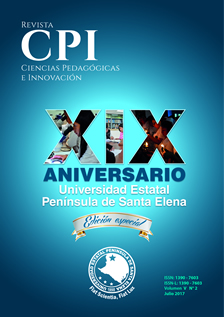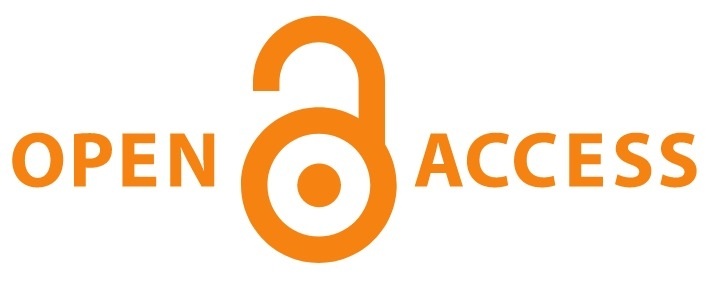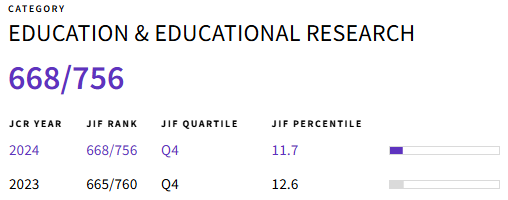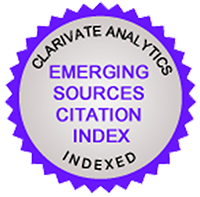La ludomotricidad en el proceso cognitivo de los niños de primer grado de Educación Básica, Cantón La Libertad
DOI:
https://doi.org/10.26423/rcpi.v5i2.173Palabras clave:
Psicomotricidad, Desarrollo cognitivo, Educación inicial, Estrategias didácticasResumen
La educación integral, como pilar del sistema educativo ecuatoriano, establece potenciar el aprendizaje a través de experiencias vivenciales y significativas que se deben dar en ambientes adecuados y estimulantes; brindando un norte para justificar el presente artículo que constituye un análisis de la pedagogía lúdica y la psicomotricidad como una herramienta de mediación social – educativa, en que la relación psicosomática entre las acciones motoras, las respuestas psíquicas del aprendizaje, las emociones o sentimientos en una resonancia afectiva, crean el escenario para una combinación de componentes del desarrollo integral, enfocado a la educación formal o escolarizada. Por tal motivo, se direcciona un método de intervención didáctico a favor del aprendizaje, y cuya acción lúdica como herramienta pedagógica utiliza la exploración, descubrimiento, conocimiento y experimentación en busca de resultados en competencias corpóreas necesarias para las siguientes etapas del proceso evolutivo. Desde esta perspectiva se realiza un análisis descriptivo, revisión de fuentes teóricas, interpretación de datos obtenidos de los instrumentos investigativos de carácter empírico, aplicados a la población, objeto de estudio como son los niños de primer grado de educación general básica de las instituciones educativas fiscales del cantón La Libertad. El alcance investigativo, propuesta metodológica van enfocados a la identificación de diferentes estrategias, recursos educativos de carácter lúdico que, desde el juego formativo y direccionado con intenciones didácticas como acción participativa e incluyente, se adapta a las circunstancias particulares y cambiantes de los contextos escolarizados; cumpliendo con las recomendaciones o directrices del desarrollo integral infantil establecidas en el “Buen Vivir”.
Descargas
Referencias
De Sousa, B. S. Descolonizar el saber, reinventar el poder. Montevideo Uruguay: Ediciones Trilce. Extensión Universitaria de la República. 2010.
Doidge, N. El cerebro se cambia a sí mismo Ediciones Generales. España: Santillana. Ediciones Generales, S.L.2008.
Escribano, G. A. Aprender a enseñar. Fundamentos de didáctica general. Cuenca: Humanidades. 2° edición corregida y aumentada. Universidad de Catilla -La Mancha. 2004.
Fernández, M. Propuesta de Aprendizaje de la Lengua Escrita. México, D.F.2005.
Gallego, R. S. Desarrollo General del Niño: El niño va creciendo. Innovación y Experiencias Educativas. 2010.
Gallo, C. L. Las prácticas corporales en la educación corporal. Ciencias -deporte, Florianópolis, V.34 -N°4 Universidad de Antioquia, Grupo de Investigación: Estudios en Educación, 2012. 825 -843.
González, G. M. La escritura en primer año de la escuela primaria y la Psicomotricidad. Psicomotricidad, Movimiento y Emoción,2015. Vol. 1, No. 1.
Justo, M. E. Desarrollo Piscomotor en Educación Infantil. Almeira España: Universidad del Almeira. 2014.
Justo, M. e. Desarrollo Psicmotor en Educación Infantil. Baes para la intervención. Almeria -España: Universidad de Almería.2014
Larrea, d. G. El Currículo de la Educación Superior desde la Complejidad Sistémica. algunas consideraciones para orientar el proceso de construcción del nuevo modelo de formación universitaria. Quito: CES. Consejo Educación Superior.2014
León, L. C. Secuencias de desarrollo infantil integral. Caracas, Venezuela: Universidad Católica Andrés Bello. 2008.
Núñez, S., & Fernández, V. La Educación Psicomotriz. Lima / Perú: Eximpress S.A.2010.
Oseda, G. J., Mendivel, J. R., & Zevallos, S. L. Psicomotricidad e iniciación a la escritura en niños de 5 años. Apuntes de Ciencia & Sociedad. Universidad Continental. 2015Vol.5 N° 1, 59 -64. ISSN: 2 22 5-51 5 X.
Owens, R. El desarrollo del Lenguaje. Madrid, España: PEARSON. Prentice Hall.2008
Piaget, J. Psicología del niño. Barcelona -España. Nueva edición por editorial 2002: Edit Morata.
PNBV, S. N. (2013 -2017). Plan Nacional del Buen Vivir 2013 -2017. Todo el mundo mejor. Quito: SENPLADES. Primera edición. ISBN-978-9942-07-448-5. www.buenvivir.gob.ec.
SENESCYT. Secretaría de Educación Superior, Ciencia, Tecnología e Innnovación. Sistema de Nivelación y Admisión. Proyecto Integrador de Saberes. Proceso metodológico. Quito: Senescyt. Recuperado el 27 de Febrero de 2016, de educacionsuperior.gob.ec: http://prometeo.educacionsuperior.gob.ec/
Vargas, R. J., & Arán, F. Importancia de la Parentalidad para el Desarrollo Cognitivo Infantil: una Revisión Teórica. Revista Latinoamericana de Ciencias Sociales, Niñez y Juventud,2014171-186.
Yturralde, T. E. La Lúdica.org. 2014Obtenido de http://www.ludica.org/
Descargas
Publicado
Número
Sección
Licencia
El titular de los derechos de autor de la obra, otorga derechos de uso a los lectores mediante la licencia Creative Commons Atribución-NoComercial-CompartirIgual 4.0 Internacional. Esto permite el acceso gratuito inmediato a la obra y permite a cualquier usuario leer, descargar, copiar, distribuir, imprimir, buscar o vincular a los textos completos de los artículos, rastrearlos para su indexación, pasarlos como datos al software o usarlos para cualquier otro propósito legal.
Cuando la obra es aprobada y aceptada para su publicación, los autores conservan los derechos de autor sin restricciones, cediendo únicamente los derechos de reproducción, distribución para su explotación en formato de papel, así como en cualquier otro soporte magnético, óptico y digital.

















